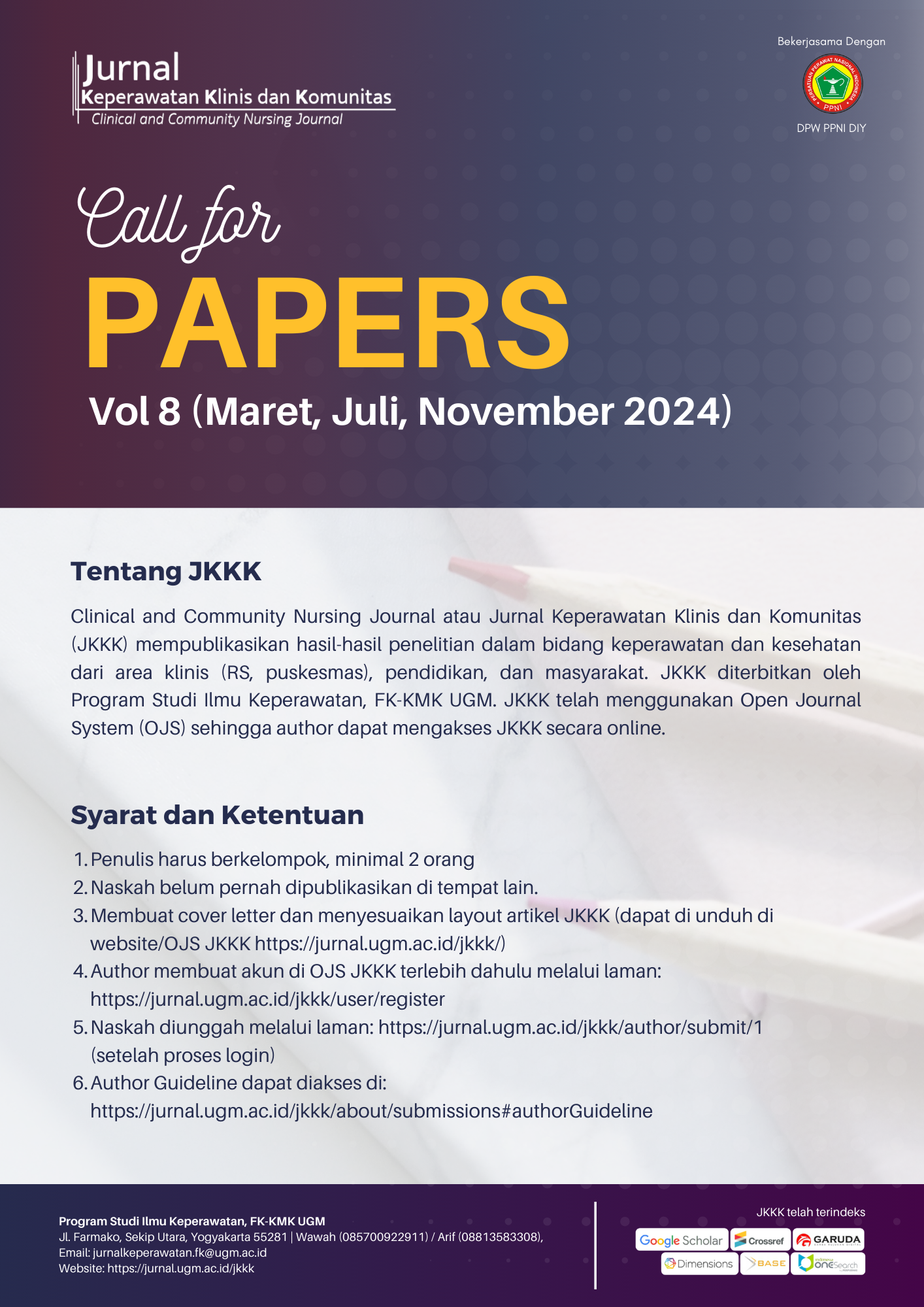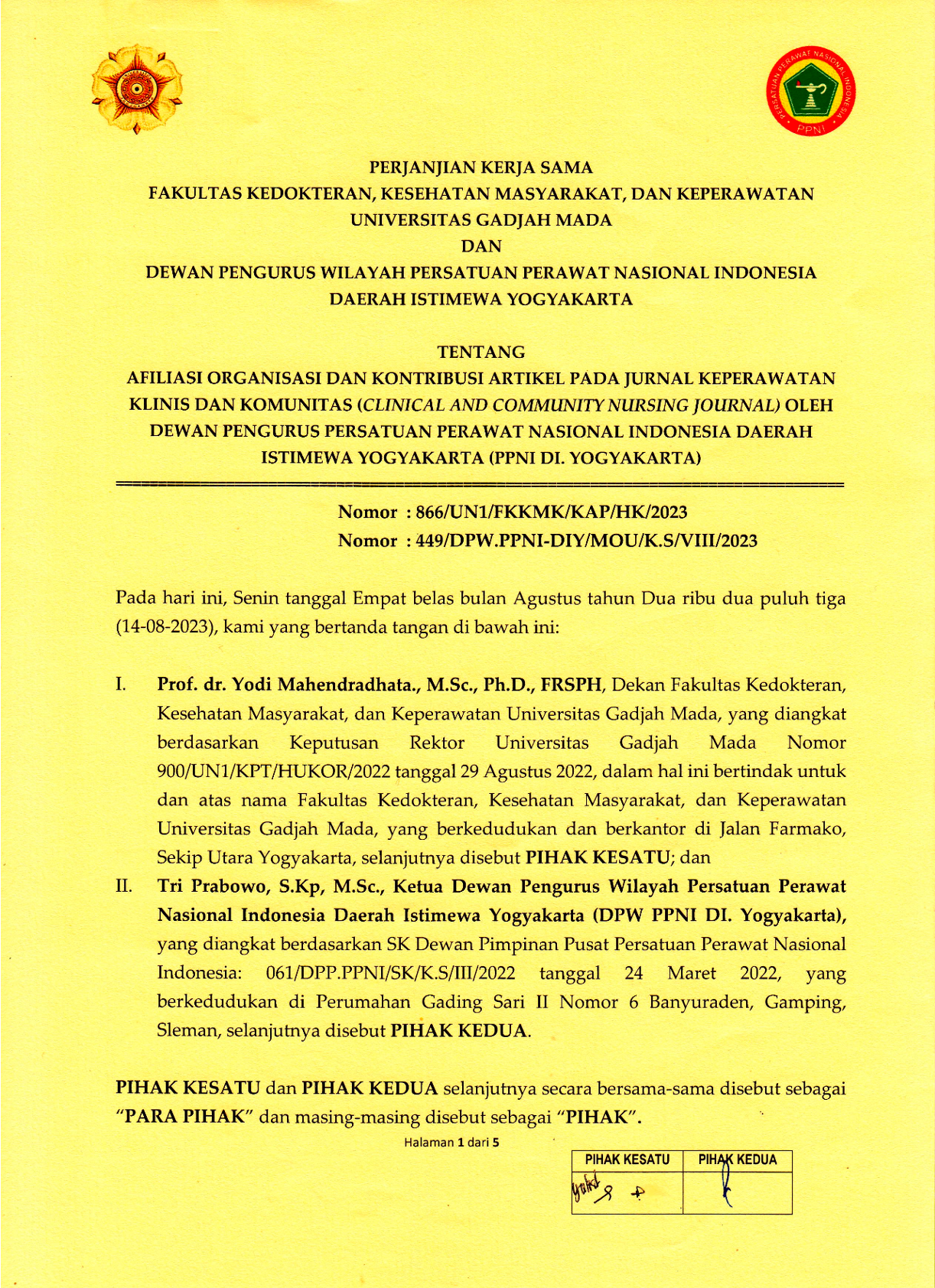Pengaruh Edukasi Kesehatan Paket Cerdas Ibu Menyusui (PCIM) terhadap Efikasi Diri Ibu Primipara dalam Merawat Bayi Baru Lahir di Haharu, Sumba Timur
Umbu Nggiku Njakatara(1*), Lely Lusmilasari(2), Anik Rustiyaningsih(3)
(1) Program Studi Magister Keperawatan, Fakultas Kedokteran, Kesehatan Masyarakat, dan Keperawatan, Universitas Gadjah Mada
(2) Departemen Keperawatan Anak dan Maternitas, Fakultas Kedokteran, Kesehatan Masyarakat, dan Keperawatan, Universitas Gadjah Mada
(3) Departemen Keperawatan Anak dan Maternitas, Fakultas Kedokteran, Kesehatan Masyarakat, dan Keperawatan, Universitas Gadjah Mada
(*) Corresponding Author
Abstract
Background: Maternal self-efficacy is a mother's ability to manage her role. This ability has a positive impact towards children’s safety and development. Knowledge to take care of newborn will increase maternal self-efficacy, especially for primiparous (a woman who is pregnant or gives birth for the first time). Health education may be one effective way, among others, to deliver this knowledge.
Objective: To examine the effect of a health education module called Paket Cerdas Ibu Menyusui/PCIM (translated as breastfeeding smart package) toward self-efficacy of primiparous in caring newborns. The second objective is to examine the corelation between social support and maternal self-efficacy.
Method: This research used a quasi-experimental with pre-test and post-test for comparing intervention, and a control grup. There were 60 primiparous who became participants which were selected by consecutive sampling techniques. Research instruments were PSES scale for primiparous self-efficacy and PSSP for social support measurement. Data analysis were using paired t-test, independent t-test and Spearman test with significance level or p value <0,05.
Results: PCIM health education module affected maternal self-efficacy score. Respondents received scores of 3,51 before intervention and increased into 5,49 after intervention (p=0,001). The increasement in intervention group was higher than control group (p=0,001). On the other hand, there was not any significant correlation between social supprot and self-efficacy for both groups (p>0,05).
Conclusion: PCIM health education module increases the self-efficacy of primiparous in caring for newborns. But, there is not any correlation between social support and the self-efficacy of primiparous in caring for newborns.
ABSTRAK
Latar Belakang: Efikasi diri ibu merupakan keyakinan seorang ibu akan kemampuannya dalam menjalankan peran yang dapat memberi pengaruh positif terhadap keselamatan dan perkembangan anaknya. Untuk meningkatkan keyakinan ibu, khususnya pada ibu primipara (perempuan yang pertama kali hamil atau melahirkan bayi) diperlukan pengetahuan dalam merawat bayi baru lahir yang dapat dilakukan melalui edukasi kesehatan.
Tujuan: Untuk mengetahui pengaruh edukasi kesehatan paket cerdas ibu menyusui terhadap efikasi diri ibu primipara dalam merawat bayi baru lahir, dan hubungan dukungan sosial dengan efikasi diri ibu primipara.
Metode: Penelitian ini menggunakan rancangan quasi experiment pre-test and post-test dengan kelompok kontrol. Subjek penelitian berjumlah 60 ibu primipara yang dipilih menggunakan teknik consecutive sampling. Penelitian ini menggunakan instrumen PSES untuk mengukur efikasi diri ibu primipara dalam merawat bayi baru lahir dan PSSP untuk melihat hubungan dukungan sosial dengan efikasi diri ibu. Analisis data menggunakan uji paired t-test, independent t-test dan Spearman dengan tingkat kemaknaan p<0,05.
Hasil: Edukasi kesehatan paket cerdas ibu menyusui berpengaruh terhadap efikasi diri ibu primipara dalam merawat bayi baru lahir dengan nilai 3,51 sebelum intervensi, menjadi 5,49 setelah intervensi dengan nilai (p=0,001). Peningkatan efikasi diri pada kelompok intervensi lebih tinggi dari kelompok kontrol (p=0,001). Tidak terdapat hubungan yang signifikan antara dukungan sosial dengan efikasi diri pada kedua kelompok (p>0,05).
Kesimpulan: Edukasi kesehatan paket cerdas ibu menyusui memengaruhi peningkatan efikasi diri ibu primipara dalam merawat bayi baru lahir. Dukungan sosial tidak berhubungan dengan peningkatan efikasi diri ibu primipara.
Keywords
Full Text:
PDFReferences
- Shorey S, Chan SWC, Chong YS, He HG. Maternal parental self-efficacy in newborn care and social support needs in Singapore: A correlational study. J Clin Nurs. 2014;23(15–16):2272–83.
- Pollard D, Guill M. The Relationship between Baseline Self-Efficacy and Breastfeeding Duration. South Online J Nurs. 2009;9(4).
- Dennis C. The Breastfeeding Self‐Efficacy Scale: Psychometric Assessment of the Short Form. J Obstet Gynecol Neonatal Nurs. 2003 Nov;32(6):734–44.
- Buxton, K. E., Gielen, A.C., Faden, R.R., Brown, C.H., Paige, D.M. & C, A.J. Women intending to breastfeed: Predictors of early infant feeding experiences. Am J Prev Med. 1991;7:101–6.
- Zakiah, Rasyad AS, Sujatno HRM. Efikasi Diri Dan Lama Pemberian Air Susu Ibu Saja Selama 2 Bulan Postpartum. Gaster. 2012;9(2):7–16.
- World Health Organization. WHO recommendations on postnatal care of the mother and newborn. 2014.
- Citrawati NK, Widyandana, D.Hapsari E. Pengaruh pendidikan kesehatan dengan media audiovisual manajemen laktasi terhadap tingkat pengetahuan dan self efficacy ibu menyusui. 2015.
- Joventino ES, Ximenes LB, da Penha JC, Andrade LC de O, de Almeida PC. The use of educational video to promote maternal self-efficacy in preventing early childhood diarrhoea. Int J Nurs Pract. 2017;23(3):1–7.
- Salonen AH, Kaunonen M, Åstedt-Kurki P, Järvenpää AL, Isoaho H, Tarkka MT. Parenting self-efficacy after childbirth. J Adv Nurs. 2009;65(11):2324–36.
- Leerkes, E. M., & Crockenberg SC. The development of maternal self-efficacy and its impact on maternal behavior. Infancy. 2002;3(2):227–47.
- Wardhani MA. Gambaran tingkat self-efficacy untuk menyusui pada ibu primigravida [Thesis]. Jakarta: Fakultas Ilmu Keperawatan Universitas Indonesia; 2012.
- Astutiningrum, D, Hapsari EH. PENGARUH KONSELING TERHADAP PARENTING SELF EFFICACY PADA IBU POSTPARTUM DENGAN SECTIO CAESAREA. 2015;
- Bandura,A. Self-efficacy : the exercise of control (Fifth Print). New York: W.H. Freeman and Company; 1997.
- Notoatmodjo S. Promosi Kesehatan & Perilaku. Jakarta: Rineka Cipta. 2007.
- Efendi F, Makhfudli. Keperawatan Kesehatan Komunitas. Jakarta: Salemba Medika; 2009.
- Leahy-Warren P, Mccarthy G, Corcoran P. First-time mothers: Social support, maternal parental self-efficacy and postnatal depression. J Clin Nurs. 2012;21(3–4):388–97.
- Bäckström CA, Wahn EIH, Ekström AC. Two sides of breastfeeding support: Experiences of women and midwives. Int Breastfeed J. 2010 Nov;5(1):1–8.
- Heri D.J. Maulana. Promosi kesehatan. Jakarta: EGC; 2009.
- Troutman B, Moran TE, Arndt S, Johnson RF, Chmielewski M. Development of parenting self-efficacy in mothers of infants with high negative emotionality. Infant Ment Health J. 2012 Jan;33(1):45–54.
Article Metrics
Refbacks
- There are currently no refbacks.
Copyright (c) 2021 Umbu Nggiku Njakatara, Lely Lusmilasari, Anik Rustiyaningsih

Jurnal Keperawatan Klinis dan Komunitas (Clinical and Community Nursing Journal)
collaborates with DPW PPNI DIY
![]()
Jurnal Keperawatan Klinis dan Komunitas (Clinical and Community Nursing Journal) is licensed under a Creative Commons Attribution-ShareAlike 4.0 International License.




